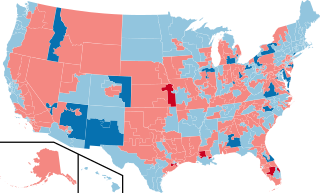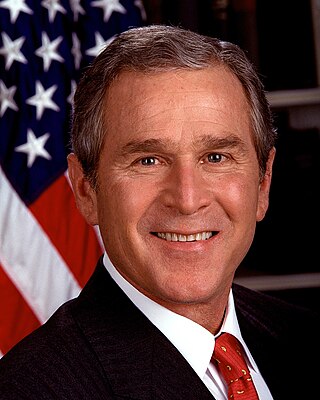
The politics of Puerto Rico take place in the framework of a democratic republic form of government that is under the jurisdiction and sovereignty of the United States Congress as an organized unincorporated territory. Since the 1898 invasion of Puerto Rico by the United States during the Spanish–American War, politics in Puerto Rico have been significantly shaped by its status as territory of the United States. The nature of Puerto Rico's political relationship with the United States is the subject of ongoing debate in Puerto Rico, in the United States, the United Nations and the international community, with all major political parties in the archipelago calling it a colonial relationship.

Each of the 50 U.S. states, the District of Columbia, and territories of the United States holds either primary elections or caucuses to help nominate individual candidates for president of the United States. This process is designed to choose the candidates that will represent their political parties in the general election.

Super Tuesday is the United States presidential primary election day in February or March when the greatest number of U.S. states hold primary elections and caucuses. Approximately one-third of all delegates to the presidential nominating conventions can be won on Super Tuesday, more than on any other day. The results on Super Tuesday are therefore a strong indicator of the likely eventual presidential nominee of each political party.

From January 19 to June 8, 2004, voters of the Republican Party chose its nominee for president in the 2004 United States presidential election. Incumbent President George W. Bush was again selected as the nominee through a series of primary elections and caucuses culminating in the 2004 Republican National Convention held from August 30 to September 2, 2004, in New York City.

The 2008 United States House of Representatives elections were held on November 4, 2008, to elect members to the United States House of Representatives to serve in the 111th United States Congress from January 3, 2009, until January 3, 2011. It coincided with the election of Barack Obama as president. All 435 voting seats, as well as all 6 non-voting seats, were up for election. The Democratic Party, which won a majority of seats in the 2006 election, expanded its control in 2008.

The 2008 Puerto Rico Democratic presidential primary took place on June 1, 2008. It was an open primary. Puerto Rico initially planned to hold caucuses, as was done in 2000 and 2004, on June 7, 2008. In December 2007, an error in the plan was discovered; the caucus date should have read June 1, 2008. Puerto Rico also decided to conduct a primary, rather than caucuses. Puerto Rico sent 55 pledged delegates to the 2008 Democratic National Convention. These delegates were allotted on a proportional basis. The territory's delegation also included eight unpledged "superdelegates". Puerto Rico also selected one unpledged add-on delegate. Selection of the unpledged add-on delegate occurred at the Assembly of the Democratic Party of the Commonwealth of Puerto Rico on June 21, 2008, in San Juan. Polls were open from 8:00 am to 3:00 pm, prevailing local time, Atlantic Standard Time (AST). Hillary Clinton won the primary.

From January 3 to June 5, 2012, voters of the Democratic Party chose its nominee for president in the 2012 United States presidential election. President Barack Obama won the Democratic Party nomination by securing more than the required 2,383 delegates on April 3, 2012, after a series of primary elections and caucuses. He was formally nominated by the 2012 Democratic National Convention on September 5, 2012, in Charlotte, North Carolina.

The 2012 United States elections took place on November 6, 2012. Democratic President Barack Obama won reelection to a second term and the Democrats gained seats in both chambers of Congress, retaining control of the Senate even though the Republican Party retained control of the House of Representatives. As of 2024, this is the most recent election cycle in which neither the presidency nor a chamber of Congress changed partisan control, and the last time that the party that won the presidency simultaneously gained seats in both the House of Representatives and the Senate.

The 2016 United States elections were held on Tuesday, November 8, 2016. Republican nominee Donald Trump defeated Democratic former Secretary of State Hillary Clinton in the presidential election, while Republicans retained control of Congress. This marked the first and most recent time Republicans won or held unified control of the presidency and Congress since 2004.

Although Puerto Rico did not participate in the November 8, 2016, general election because it is a territory and not a state, the five non-incorporated territories that send delegates to the United States House of Representatives participated in the presidential primaries.

The 2020 United States presidential election in Iowa was held on Tuesday, November 3, 2020, as part of the 2020 United States presidential election in which all 50 states plus the District of Columbia participated. Iowa voters chose electors to represent them in the Electoral College via a popular vote, pitting the Republican Party's nominee, incumbent President Donald Trump of Florida, and running mate Vice President Mike Pence of Indiana against Democratic Party nominee, former Vice President Joe Biden of Delaware, and his running mate California Senator Kamala Harris. Iowa has six electoral votes in the Electoral College.

Although Guam did not participate in the 2020 presidential election because it is a U.S. territory and not a state, it still participated in the U.S. presidential primaries and caucuses. Former vice president Joe Biden won the Democratic caucus, held on June 6. The Republican caucus, held on March 14 in the form of a "state convention", endorsed incumbent President Donald Trump.

The 2000 American Samoa Democratic presidential caucuses were held on March 7, 2000, as part of the 2000 Democratic Party primaries for the 2000 presidential election. 3 delegates to the 2000 Democratic National Convention were allocated to the presidential candidates, the contest was held on Super Tuesday alongside primaries and caucuses in 15 other states.

The 2000 American Samoa Republican presidential caucuses were held on February 26, 2000, as part of the 2000 Republican Party primaries for the 2000 presidential election. 4 delegates to the 2000 Republican National Convention were allocated to the presidential candidates, the contest was held alongside primaries in Guam and the Virgin Islands.

Although American Samoa will not participate in the 2000 presidential election because it is a U.S. territory and not a state, it participated in the U.S. presidential primaries and caucuses for both the Democratic and Republican parties.

The 2000 Guam Democratic presidential caucuses were held on March 18, 2000, as part of the 2000 Democratic Party primaries for the 2000 presidential election. 6 delegates to the 2000 Democratic National Convention were allocated to the presidential candidates.

Although Guam will not participate in the 2000 presidential election because it is a U.S. territory and not a state, it can participate in the U.S. presidential primaries and caucuses for both the Democratic and Republican parties, also Guam instead uses the presidential straw poll on Election Day.

The 2000 U.S. Virgin Islands Democratic presidential caucuses were held on April 1, 2000, as part of the Democratic Party primaries for the 2000 presidential election. 6 delegates to the Democratic National Convention will be allocated to presidential candidates.

The 2000 Puerto Rico Republican presidential primary was held on February 27, 2000, as part of the Republican Party primaries for the 2000 presidential election. 14 delegates to the Republican National Convention were allocated to presidential candidates.

Although Puerto Rico does not participate in U.S. presidential general elections because it is an unincorporated territory and not a state, and therefore cannot send members to the U.S. Electoral College, Puerto Ricans are citizens of the United States and participate in the U.S. presidential primaries and caucuses.















